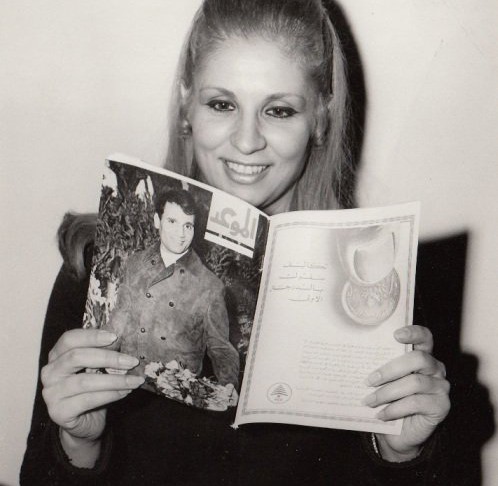Thousands of Wishes for the Blackbird: Get Well Soon
by Hamdy El-Gazzar / March 10, 2014 / No comments
An ode to the singer Sabah, “the spirit of the morning.”
For the Lebanese Blackbird, the singer, the actress Sabah: Here is small segment of an old song you sung for the movie El Aydi el Naema (Soft Hands), which was transcribed in a novel by Tawfiq al-Hakim:
“With an ‘I’ I love you
With an ‘s’ so much
With an ‘m’ my soul is beside you.”
Before you, we did not know anyone who could’ve taught us the alphabet with her art!

- “From Egypt” attempts to draw a cultural map of Egypt and the Arab world by profiling the artistic, literary, and political issues that affect the region via on-the-ground coverage of current events, publications, and the fight for freedom of expression.

- Hamdy El-Gazzar is an Egyptian writer and one of the 39 young Arab writers included in the Beirut 39 Project. His first novel, Sihr Aswad (Dar Merit, 2005) won the prestigious Sawaris Award, and was subsequently translated by Humphrey Davies (Black Magic, AUC Press, 2007). His second novel, Ladhdhat Sirriyya (Secret Pleasures) was published by Dar al-Dar in 2008. He is currently working on a third novel.
I remember: In one of her concerts, Sabah wore a brilliant fuchsia dress, her whole spirit light, and sang for simplicity:
“Here is a simple life
What a lovely life
You feed me cheese and olives in the morning
Then you feed me potato for lunch.”
She also used to call her beloved by her favorite pet name, saying, “Oh my master… my master…”
Back then, nobody told us that Sabah is not Egyptian, but Lebanese, that her real name is Jeanette Gergis Al-Feghali, that her skin is white and her hair blonde, and that she’s actually someone important. We had these initial, false impressions about her because she appeared on-screen as a homemaker preparing breakfast during Ramadan for the comedian Fouad el-Mohandes. I remember her yelling at him: “Even if you said that we have lots of food, you still shouldn’t over-spend the money.” Then he’d yell back at her, “Oh people! I’m fasting and feeling tired, and my wife wants to make me starve—even during Ramadan!”
Nobody told us that the little girl who came to Cairo in the 1940s came to sing and act in theater. She didn’t look like Soad Hosny or Faten Hamama, but we discovered that she really just looks like herself. In fact, we discovered that she looks like a lot of girls in our neighborhood, that she loves grilled potatoes, corn, Rushdy Abaza, and handsome guys like him. We know she still loves that type of guy today!
“Sabooha” the “legend,” was born November 10, 1927. When her daughter turned 17, she sang: “My beautiful girl became sweet…She became sweet with long hair…”
Sabah the singer is the spirit of sabah (the morning) and its bright, chirping sounds. We used to hear her on our way to school, to the mall, to work, and to the first girl we discovered that we loved.
She is like the morning, and declares love with no shame. She was flirtatious like no other Arabic woman before her.
Sabah’s voice, which has accompanied me since childhood is joyful, affecting, and flowing with femininity. It’s a promise that never lets down sensitive, demanding ears, nor the spirit that smiles at the grace of professional art.
A thousand wishes for you to get well soon, Lebanese Blackbird; you are the star of the morning. A thousand wishes for you; you are a dear person for art and artists, and for those who experience beauty when you sing—anytime and anywhere.





